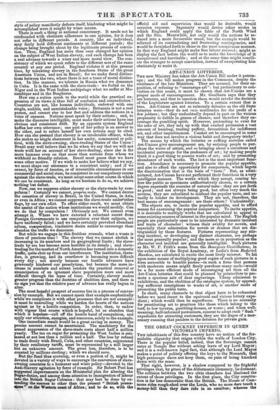ART-UNION LOTTERIES.
THE new Ministry has taken the Art-Union Bill under it patron- age ; and the bill makes progress in the Commons, despite the resistance of the late Ministers. They are accused, for their op- position, of refusing to "encourage art": but preliminary to con- viction on this count, it must be shown that Art-Unions are a proper mode of encouragement. Mr. Goulburn says that they are lotteries, and that to sanction them would revoke the decision of the Legislature against lotteries. To a certain extent that is true. Art-Unions are not so ruinously delusive as the old State lotteries were—they do not ruin multitudes for the profit of a few jobbers ; but they undoubtedly depend in part on the vicious propensity to dabble in games of chance, and therefore they en- courage the gambling spirit. Moreover, pretending to exist for the sake of art, they mix up with that exalted pretension a vast amount of humbug, trading puffery, favouritism for indifferent art, and other impertinences. Cannot art be encouraged in some way that does not involve a vicious habit and derogatory tricks ? The means by which the lotteries or raffling societies called Art-Unions give encouragement are, by enticing people to pur- chase the wares of artists, and so bringing about a circuitous and incidental patronage for the professors of art ; by making people think it a good thing to possess works of art ; and by promoting abundance of such works. The last is the most important func- tion. Abundance is necessary to promote the popular appetite; and also to afford the opportunity for comparison, which begets the discrimination that is the basis of "taste." But, as admi- nistered, Art-Unions have not performed their functions in a very intelligent manner. The works which they accept, coming be- fore the public as specimens authoritatively chosen, to a certain degree supersede the exercise of natural taste: they are put forth as good ; and not always being good, but often very much the reverse, they are calculated to mislead the popular taste, and ac- tually to hinder its development. They are not, therefore, the best means of encouragement : are there others ? Undoubtedky. The objects are, to incite the popular appetite, and to afford means for exercising the popular comparison. To incite appetite, it is desirable to multiply works that are calculated to appeal to some existing sources of interest in the popular mind. The English people are particularly open to be interested by dramatic incident and traits of character : witness their avidity for novels, and especially their admiration for novels or dramas that are dis- tinguished by those features. Pictures representing any stir- ring incident, or developing any distinct character, are perhaps the most generally popular ; and the more so in proportion as the character and incident are generally intelligible. Such pictures as Mr. W. P. Frith's scene from the Bourgeois Gentilhomme, in the exhibition of the Royal Academy, or Leslie's from Roderick Random, are calculated to excite the most lively interest. To hit upon some means of multiplying good copies of such pictures in a form accessible to humble purses—in such a form that persons with moderate means might freely purchase many such—would be a far more efficient mode of encouraging art than all the Art-Union lotteries that could be planned by printsellers to pro- mote a spurious sale of dear engravings. Cheap admission to exhibitions, and the abolition of the catalogue system, by append- ing sufficient inscriptions to works of art, is another mode of promoting the public taste. In short, many channels to that object have to be exhausted before we need resort to the equivocal and vicious lottery expe- dient; which would then be superfluous. There is no necessity for prostituting art to practices like those which belong to the turf, to low taverns, gambling-houses, or worse ; and when well- meaning, half-informed patronizers, consent to adopt such " flash" expedients for attracting customers, they are the dupes of a mer- cenary cunning that panders to the delusion for private gain.


























 Previous page
Previous page